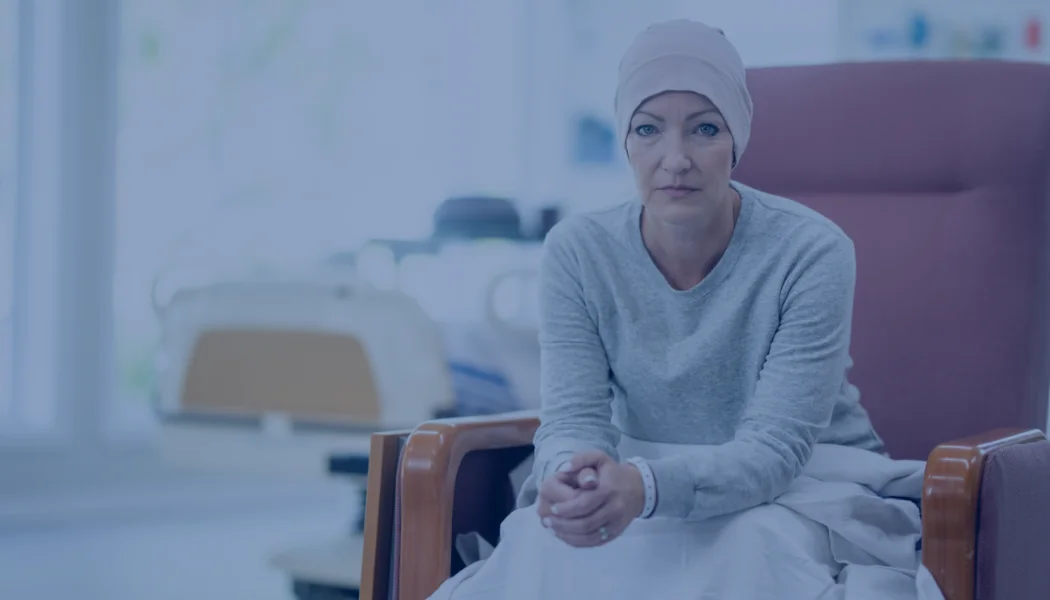Managing Anxiety & Depression in Cancer Patients

Cancer changes the entire landscape of a person’s life. Career plans, the future, the present; these are all called into question when a diagnosis arrives. Indeed, it is expected for cancer patients to become sad or angry, anxious or overwhelmed, as they come to grips with the battle ahead. However, those who remain in a prolonged state of anxiety or depression should seek help.
Since one in four cancer patients is diagnosed with clinical depression, it’s important that patients know how, where, and when to get help. Managing anxiety and depression so that these do not become stumbling blocks to successfully surviving cancer is integral to the fight.
Know Your Foe
The signs and symptoms of depression vary by individual. The profundity of symptoms ranges from mild difficulty adjusting to living with cancer to those who encounter serious mental health problems, such as debilitating anxiety and major depression. The hallmarks of an individual’s ability to cope and the assistance from which they’d benefit depend on the seriousness of their distress and can be categorized as follows:
- Normal adjustment. Those patients who cope well and learn quickly how to productively handle the challenges related to a cancer diagnosis. Patient adjustments come at different times, including when they are diagnosed, after treatment, after finishing treatment, go into remission, suffer a recurrence, and become a survivor.
- Social or psychological distress. Those patients who exhibit initial trouble adjusting to life’s challenges post-diagnosis and managing the stress as a result. Professional help in developing adaptive coping skills is beneficial.
- Adjustment disorder. These patients have difficulty making changes in their lives, which successfully allows them to manage stressful situations and includes depression, anxiety, emotional, social, or behavioral issues, and negatively impacts overall quality of life. Professional help and medicine may be necessary to help this type of patient return to and maintain emotional equilibrium.
- Anxiety disorder. Patients are extremely anxious as a result of stress, such as a cancer diagnosis, and exhibit worry, fear, and dread. The severity of symptoms affects the patient’s ability to lead everyday, productive lives, and disorders can include generalized anxiety, panic disorder, agoraphobia, social anxiety, Obsessive-Compulsive Disorder, and Post-Traumatic Stress Disorder. Treatments vary by the diagnosis of a particular anxiety disorder. Patients are encouraged to talk to their doctors to develop a plan which will cater to their specific needs be they psychological or pharmaceutical.
Risk Management
Cancer patients are encouraged to find ways of managing undue stress and mounting anxiety, which can inhibit their ability to successfully handle an already difficult recovery. The impact of anxiety on recovery is biologically tangible. As per the National Academies of Science:
- Stress hormones increase the production of free radicals, which contribute to DNA damage and impaired immune function, thus hampering recovery.
- Stress hormones increase systemic inflammation by increasing levels of inflammatory proteins (cytokines), which impair immune function and actually promote cancer growth.
- Stress hormones make it more difficult for abnormal cells to die while also impeding DNA repair, a process which is vital to the body’s self-regulating anticancer mechanisms.
- Stress hormones fuel the production of VEGF (vascular endothelial growth factor), a protein discovered by the National Foundation for Cancer Research’s long-supported scientist, Harold Dvorak, and other secretions, which can promote tumor cell growth.
Help and Healing
Patients are encouraged to work with their doctors to find the courses of therapy that will most successfully and productively help them to manage anxiety, stress, and depression so that they can concentrate on getting better. These can include, but are not limited to:
- Oncological Stress and anxiety are often the byproduct of physical limitations due to the cancer or its treatment. Taking advantage of physical therapy, occupational therapy, speech and language pathology, and manual therapy provides a wide range of tools to combat cancer-related side effects and alleviate those emotional byproducts that detract from a patient’s quality of life.
- Spiritual support. Leaning on one’s personal faith can be a powerful tool in navigating a cancer diagnosis. Talking with clergy or spiritual counselors offers a natural, self-managed way to address anxiety and stress while gaining perspective on their cancer journey.
- Some patients experience profound depression or anxiety and must therefore include in their drug therapy protocols treatments such as antidepressants. Patients who suffer from uncontrolled anxiety, fear, and dread should discuss with their doctors which drugs can help them lessen those symptoms while at the same time not interfere with chemotherapy or oncology drugs they need to continue their journey toward being cancer-free.
The stressors triggered by cancer are certainly in no short supply. However, patients who plan proactively and draw on the rich and diverse options readily available through their doctors, community, and care team will find they have the choice to experience recovery in more productive ways. There is no one right way to manage recovery; however, mounting anxiety or depression should not be ignored. Having cancer does not require patients to forfeit living their best life even while battling the disease.
Please take a moment to share this important message with your friends.
Follow us on Facebook, Twitter, and Instagram for the latest research and cancer prevention tips.
Sign-up to Stay Informed About Cancer Research Breakthroughs with NFCR!
References:
- https://www.cancercenter.com/ctca-difference/integrative-cancer-treatment/anxiety-stress
- https://www.cancer.gov/about-cancer/coping/feelings/anxiety-distress-pdq
- https://integrativeoncology-essentials.com/2012/04/anticancer-lifestyle-stress-reduction-101












